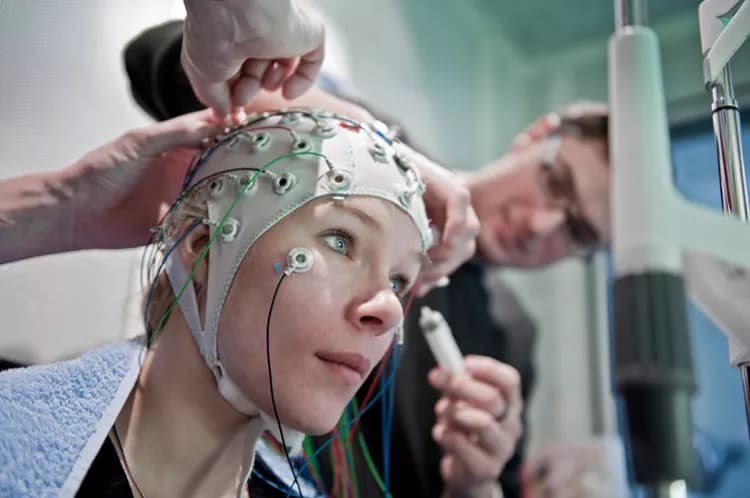We do not always say what we think: we like to hide certain prejudices, sometimes even from ourselves. But unconscious prejudices become visible with tests, because we need a longer time if we must associate unpleasant things with positive terms. Researchers in Bern now show that additional processes in the brain are not responsible for this, but some of them simply take longer.
A soccer fan needs more time to associate a positive word with an opposing club than with his own team. And supporters of a political party associate a favourable attribute faster with their party than with political rivals -- even if they endeavour towards the opposite. It is long since known that a positive association with one's own group, an "in-group," happens unconsciously faster than with an "outgroup." These different reaction times become visible in the Implicit Association Test (IAT) with which psychologists examine unconscious processes and prejudices. But why the effort to address a friendly word to an outgroup takes more time was not clear up to now.
Now a team headed by Prof. Daria Knoch from the Department of Social Psychology and Social Neuroscience at the Institute of Psychology, University of Bern, shows that an additional mental process is not responsible for this, as has often been postulated -- but rather the brain lingers longer in certain processes. The study has now been published in the scientific journal "PNAS" (Proceedings of the National Academy of Sciences of the United States of America).
Number and sequence of processes are exactly the same
The researchers relied on a unique combination of methods for their study: they conducted an Implicit Association Test with 83 test subjects who are soccer fans or political supporters. While the test persons had to associate positive terms on the screen by means of a button click, either with their in-group or with an outgroup, the brain activity was recorded by means of an EEG (electroencephalogram). "We analysed these data with a so-called "microstate analysis." It enabled us to depict all processes in the brain for the first time -- from the presentation of a word up to pressing the button -- temporally and also spatially," explains co-lead author Dr. Lorena Gianotti from the Department of Social Psychology and Social Neuroscience.
The analysis shows the following: the brain runs through seven processes, from the presentation of stimulus -- i.e. a word -- up to button click, in less than one second. "The number and sequences of these processes remain exactly the same, regardless of whether the test subject had to associate positive words with the in-group, i.e. their club or their party, or with an outgroup," explains co-lead author Dr. Bastian Schiller, who is in the meantime conducting research at the University of Freiburg.
The reaction time with the outgroup situation is therefore longer, because some of the seven processes take longer -- and not because a new process is switched in between. "As a result, corresponding theories can be refuted," says Schiller.
A complete consideration of all processes in the brain is essential for an interpretation, emphasises Lorena Gianotti, and she illustrated this in the following example: on Monday after work you go out to eat with a friend and go to sleep afterwards at 10 pm. On Friday you do exactly the same thing -- but you come home two hours later since you can sleep late on the next day. If you now compare the days at 8 pm, both times you were in a restaurant and one could conclude that this is an identical time schedule. If the comparison takes place at 11 pm, you are one time already in bed and one time still on the go. One could think that on Friday you were perhaps still in the sports studio or had an entirely different daily schedule. Therefore it is clear that selective considerations do not allow any conclusion with regard to the entire day -- neither with regard to the sequence nor the activities.
"In the research of human behaviour it is essential to consider the underlying brain mechanisms. And this in turn requires suitable methods in order to gain comprehensive findings," summarises study leader Daria Knoch. A combination of neuroscientific and psychological methods can lead to new insights.
The above post is reprinted from materials provided by University of Bern.Note: Materials may be edited for content and length.
Disclaimer: DoveMed is not responsible for the adapted accuracy of news releases posted to DoveMed by contributing universities and institutions.
Primary Resource:
Schiller, B., Gianotti, L. R., Baumgartner, T., Nash, K., Koenig, T., & Knoch, D. (2016). Clocking the social mind by identifying mental processes in the IAT with electrical neuroimaging. Proceedings of the National Academy of Sciences, 201515828.
Related Articles
Test Your Knowledge
Asked by users
Related Centers
Related Specialties
Related Physicians
Related Procedures
Related Resources
Join DoveHubs
and connect with fellow professionals


0 Comments
Please log in to post a comment.